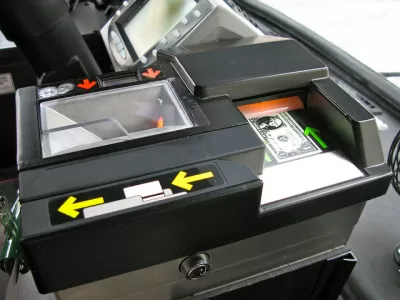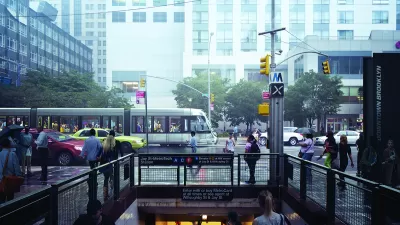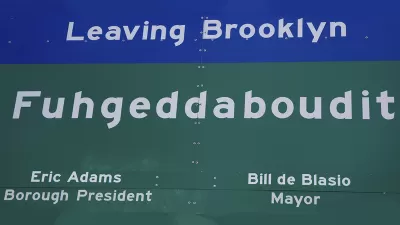Who thinks the Brooklyn-to-Queens (BQX) would pay for itself? Someone whose paycheck depends on it, Neil deMause argues.

Some boosters of New York's proposed Brooklyn-to-Queens (BQX) streetcar have argued that any spending on the project would just be an investment that would get paid back. Mayor Bill deBlasio and others have said that the value of property near the streetcar would go up, and, they argue, the resulting increase in property tax receipts would "pay off the project’s entire $2.5 billion construction cost, thus getting the city a new light rail line entirely for free," Neil deMause writes for the Village Voice.
This claim does not stand up to scrutiny, according to deMuse: "Investigation of the economic studies underpinning the streetcar’s finances, along with interviews with development and transit experts and the project’s planners, finds that the city’s contention that the BQX would pay its own way relies on untenably optimistic assumptions and creative bookkeeping."
FULL STORY: Betting On De Blasio's $2.5 Billion Streetcar Paying For Itself Is “A Recipe For Disaster"

Planetizen Federal Action Tracker
A weekly monitor of how Trump’s orders and actions are impacting planners and planning in America.

Congressman Proposes Bill to Rename DC Metro “Trump Train”
The Make Autorail Great Again Act would withhold federal funding to the system until the Washington Metropolitan Area Transit Authority (WMATA), rebrands as the Washington Metropolitan Authority for Greater Access (WMAGA).

DARTSpace Platform Streamlines Dallas TOD Application Process
The Dallas transit agency hopes a shorter permitting timeline will boost transit-oriented development around rail stations.

The Tiny, Adorable $7,000 Car Turning Japan Onto EVs
The single seat Mibot charges from a regular plug in about as much time as an iPad, and is about half the price of an average EV.

Supreme Court Ruling in Pipeline Case Guts Federal Environmental Law
The decision limits the scope of a federal law that mandates extensive environmental impact reviews of energy, infrastructure, and transportation projects.

Texas State Bills to Defund Dallas Transit Die
DART would have seen a 30% service cut, $230M annual losses had the bills survived.
Urban Design for Planners 1: Software Tools
This six-course series explores essential urban design concepts using open source software and equips planners with the tools they need to participate fully in the urban design process.
Planning for Universal Design
Learn the tools for implementing Universal Design in planning regulations.
Roanoke Valley-Alleghany Regional Commission
City of Mt Shasta
City of Camden Redevelopment Agency
City of Astoria
Transportation Research & Education Center (TREC) at Portland State University
US High Speed Rail Association
City of Camden Redevelopment Agency
Municipality of Princeton (NJ)




























